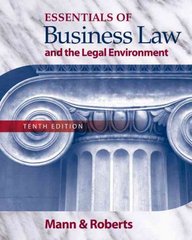Question
Consider again the profit-maximizing decision of Beth s Lawn Mowing Service from Problem Suppose Beth s greedy father decides to charge for the use of
Consider again the profit-maximizing decision of Beth s Lawn Mowing Service from Problem Suppose Beth s greedy father decides to charge for the use of the family lawn mower.
a. If the lawn mower charge is set at $100 per week, how will this affect the acres of lawns Beth chooses to mow? What will her profits be?
b. Suppose instead that Beth s father requires her to pay 50 percent of weekly profits as a mower charge. How will this affect Beth s profit-maximizing decision?
c. If Beth s greedy father imposes a charge of $2 per acre for use of the family mower, how will this affect Beth s marginal cost function? How will it affect her profit-maximizing decision? What will her profits be now? How much will Beth s greedy father get?
d. Suppose finally that Beth s father collects his $2 per acre by collecting 10 percent of the revenues from each acre Beth mows. How will this affect Beth s profit-maximizing decision? Explain why you get the same result here as for part c.
Beth's Lawn Mowing Service is a small business that acts as a price taker (MR = P). The prevailing market price of lawn mowing is $20 per acre. Although Beth can use the family mower for free (but see Problem), she has other costs given by
Total cost = 0.1q2+ 10q + 50
Marginal cost = 0.2q + 10
where q = the number of acres Beth chooses to mow in a week.
a. How many acres should Beth choose to mow in order to maximize profit?
b. Calculate Beth's maximum weekly profit.
c. Graph these results and label Beth s supply curve.
Step by Step Solution
There are 3 Steps involved in it
Step: 1

Get Instant Access to Expert-Tailored Solutions
See step-by-step solutions with expert insights and AI powered tools for academic success
Step: 2

Step: 3

Ace Your Homework with AI
Get the answers you need in no time with our AI-driven, step-by-step assistance
Get Started


